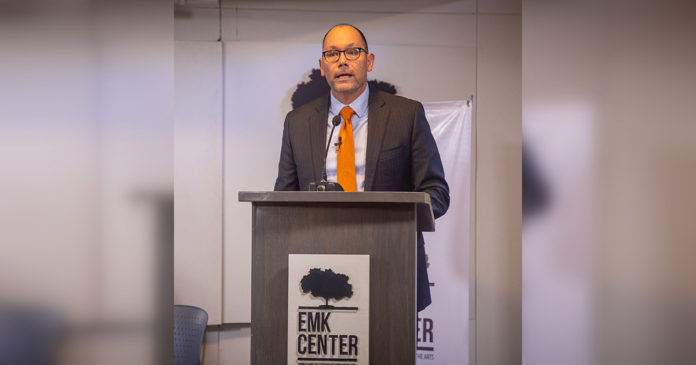Good afternoon and thank you for being with us today. Thanks to my esteemed colleagues for joining me for this event.
And before I continue, let me just state here, for the record, that my remarks today did not come from ChatGPT or other artificial intelligence.
Today, we are here to discuss online freedom and business investment in Bangladesh. Since arriving in Bangladesh nearly a year ago, I’ve been impressed by the rapid pace with which Bangladesh is stepping into the digital age—from FoodPanda to bKash and beyond.
It is clear to me that Bangladesh aspires to play a key role in the digital world of this century.
The world is changing quickly. In every country, governments and societies are facing dramatic changes due to the breakneck speed of new technologies.
The challenges of accommodating these technological advancements and adjusting our legal and regulatory frameworks to reflect these changes confront us all—in the United States, in Bangladesh, and around the world.
The online world has provided us with immense opportunities and significant challenges. Governments everywhere must try to find a way to govern this online space responsibly and the user data that accompanies it.
This governance is incredibly complex. It involves economic growth, human rights and democratic values, and security.
Let’s talk economics first. No country can succeed in this century without spurring foreign direct investment and innovation.
One of our mission’s priorities here in Bangladesh is a sustainable and broadly shared prosperity realized through the expansion and diversification of Bangladesh’s economy—an economy open to greater regional and global trade.
This is a goal we share with the government of Bangladesh: A SMART Bangladesh needs greater economic connectivity to take its place as a leader on the world stage.
For Bangladesh to be more connected to the global economy and see increased trade and investment, global businesses must find a welcoming, enabling business environment in Bangladesh.
We’ve heard from U.S. businesses about their desire to invest and grow their business here. The Bangladesh market is very attractive. For this very reason, we recently opened a Foreign Commercial Service office at the embassy.
But at the same time, we hear apprehension from businesses that new laws and regulations will make it more difficult for them to do business here.
And here, let me be frank. The United States government does have concerns about the regulations for digital, social media, and over-the-top platforms the Bangladesh Telecommunications Regulatory Commission and the Ministry of Information have introduced, as well as the draft Data Protection Act, or DPA.
Because we value our partnership with the Government of Bangladesh, we have voiced these concerns directly with the government. Before I describe some of our concerns though, let me be clear: we respect that Bangladesh will choose for Bangladesh.
So, what are some of our concerns? We worry the Data Protection Act, if passed with strict data localization requirements, may force some U.S. companies currently operating in Bangladesh to leave the market.
The online platform regulations will similarly dissuade companies from investing in their businesses here, if they face criminal liability for user content.
The consequences could have very negative effects for Bangladesh. Over 2,000 startups could be put out of business, and services that Bangladeshis use millions of times every day could become inaccessible.
The culture of innovation so crucial to attracting business requires openness and freedom online. This brings me next to the topic: human rights.
The United States recognizes the need to govern online content to protect end users and vulnerable populations. This is no easy task.
However, as we look at the draft online platform regulations, we are concerned about the broad definitions for what type of online content is deemed criminal.
The ability to accept criticism and ensure freedom of speech even when that speech is unpleasant are hallmarks of a strong democracy.
The U.S. Embassy has heard from many civil society organizations and journalists. They fear these regulations and laws will restrict fundamental human rights and freedoms.
Likewise with the Data Protection Act. We are concerned the latest draft of the DPA does not provide for an independent data oversight authority and that it includes criminal penalties.
While each country must design laws that apply in its local context, there are clear international standards we urge all countries, including Bangladesh, to uphold.
Online speech and data protection are not easy issues to address. This is incredibly complex. This is why we are having this discussion.
In the United States, we know first-hand how hard it is to combat disinformation, protect vulnerable groups, and encourage business growth.
From Washington to Silicon Valley, we’ve had to learn many lessons, and we are still learning and openly debating these complex issues.
Ultimately, development and security cannot be elevated above democracy and human rights. These values are all linked and mutually reinforcing.
Protecting human rights and upholding democracy strengthens a country’s economy and brings sustainable, inclusive prosperity.
We are encouraged the government of Bangladesh continues to consult with commercial and business entities, civil society, and international partners on these topics. This openness is commendable.
We sincerely hope that the next draft of the Data Protection Act incorporates feedback from these many sectors, and we believe Bangladesh will be better for it.
We firmly believe that an appropriate balance between international data protection standards, economic connectivity, and individual rights will facilitate this country’s continued development.
We are steadfast partners of Bangladesh and want to see its success. Thank you.
*From the website of the United States Embassy in Bangladesh.


